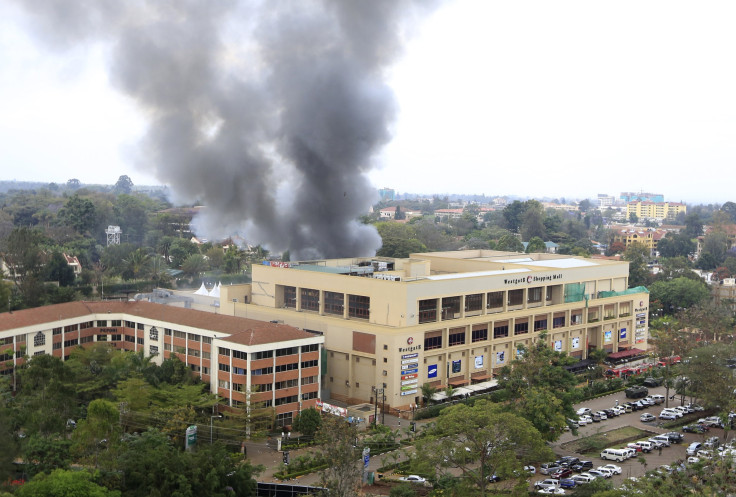Kenya Mall Attack Becomes Unwanted Backdrop For Major Tourism Push In Nairobi This Week

The attack on an upscale Nairobi shopping mall that has left at least 62 dead and as many as 175 others wounded stretched into its fourth day Tuesday as Kenya’s Interior Ministry assured the public on Twitter that the deadly standoff between government forces and Somali terrorists had entered its final phase. The bloody siege left Kenyan officials on the defensive Monday as they struggled to protect the nation’s fragile image for the sake of its $1.2 billion tourism industry.
Tourism is Kenya’s second-largest source of foreign revenue and one of the largest employers. Yet, the hostage situation -- which al-Qaeda-affiliated militant group al-Shabab ostensibly claimed responsibility for in a tweet Saturday evening -- played out in the background as members of the international travel and tourism industry converged in Nairobi this week for two critical gatherings: The Africa Hotel and Investment Forum and the Ecotourism and Sustainable Tourism Conference.
Organizers of the ecotourism conference urged participants to register with their respective embassy or high commission, travel on a pre-arranged bus to and from the airport with the conference transport company and monitor the situation on social media. The Africa Hotel and Investment Forum, hosted by CBS News Travel Editor Peter Greenberg, suggested similar measures, but reported only a 4 percent rate of delegate dropout, which it said demonstrated the industry’s resilience and commitment to Kenya. The event is Africa’s premier hotel investment conference, attracting prominent international hoteliers, investors, financiers and advisers.
Phyllis Kandie, Kenya’s Cabinet secretary for commerce and tourism who is expected to open the hotel forum, issued a statement Sunday condemning the events at the Westgate shopping mall, a popular destination for Kenya’s elite, Nairobi’s expat community and foreign tourists alike. “The tourism sector joins other Kenyans in condoling the bereaved families, including those of foreigners who have lost their lives during the Westgate attacks,” she said. “The attack was a despicable act of cowardice intended to instill fear among Kenyans and our visitors, but the attackers must never be allowed to have their way.”
Tourism is big business in Kenya, employing 150,000 people and earning the nation more than a billion dollars last year. Yet, it’s an industry that remains extremely vulnerable to security threats.
Kandie said tour operators throughout the country had pushed forward with their itineraries uninterrupted, and she urged prospective visitors not to let the terrorists succeed in instilling fear and harming the nation. “We wish to assure tourists that Kenya is peaceful and our security agencies are doing everything possible to ensure that everyone is safe. Visitors are thus welcome to visit all of our tourist facilities across the country, which are operating normally.”
The blow this bloody siege has dealt to the Kenya brand could take months -- if not years -- to heal, in part, because it is believed that al-Shabab targeted the mall knowing full well that foreigners would get mixed up in the massacre (and global headlines would ensue).
At least four Britons, two Canadians, two Frenchmen, one Australian and one Chinese were killed in the attack. President Uhuru Kenyatta sent his condolences to the victims, but urged nations not to issue travel advisories for Kenya for fear of harming an industry that accounts for about 10 percent of the nation’s economy. The former prime minister and leader of the opposition, Raila Odinga, also said in a tweet Sunday: “This is not the time to issue travel advisories. Terrorism is a global challenged that we must meet as a united front.”
Most nations already advise citizens to avoid all but essential travel near Kenya’s volatile border with war-ravaged Somalia. But the rest of the nation -- save some poorer neighborhoods of Nairobi like Eastleigh (known as “Little Mogadishu”) -- remains free of advisories.
Travel warnings immediately following the 1998 bombing of the U.S. Embassy in Nairobi brought tourism in the East African nation to a trickle. Yet, by 2008 Kenya was back on track. Over the next three years, arrivals increased by 50 percent and revenues doubled to $1.1 billion, according to government figures.
Kenyan tourism took another dip, however, after a spate of abductions in 2011 where Somali gangs kidnapped a disabled French woman and an elderly British tourist in two separate attacks near the coastal resort of Lamu. The incidents spurred the government to send troops into Somalia to help in the fledgling government’s war against al-Shabab.
Many analysts warned at the time that a retaliatory attack from al-Shabab was likely, and the still unresolved mall siege serves as a sad reminder that Kenya’s recent economic prosperity has yet to be matched by sufficient investments in security, border control and the gathering of intelligence.
© Copyright IBTimes 2024. All rights reserved.






















